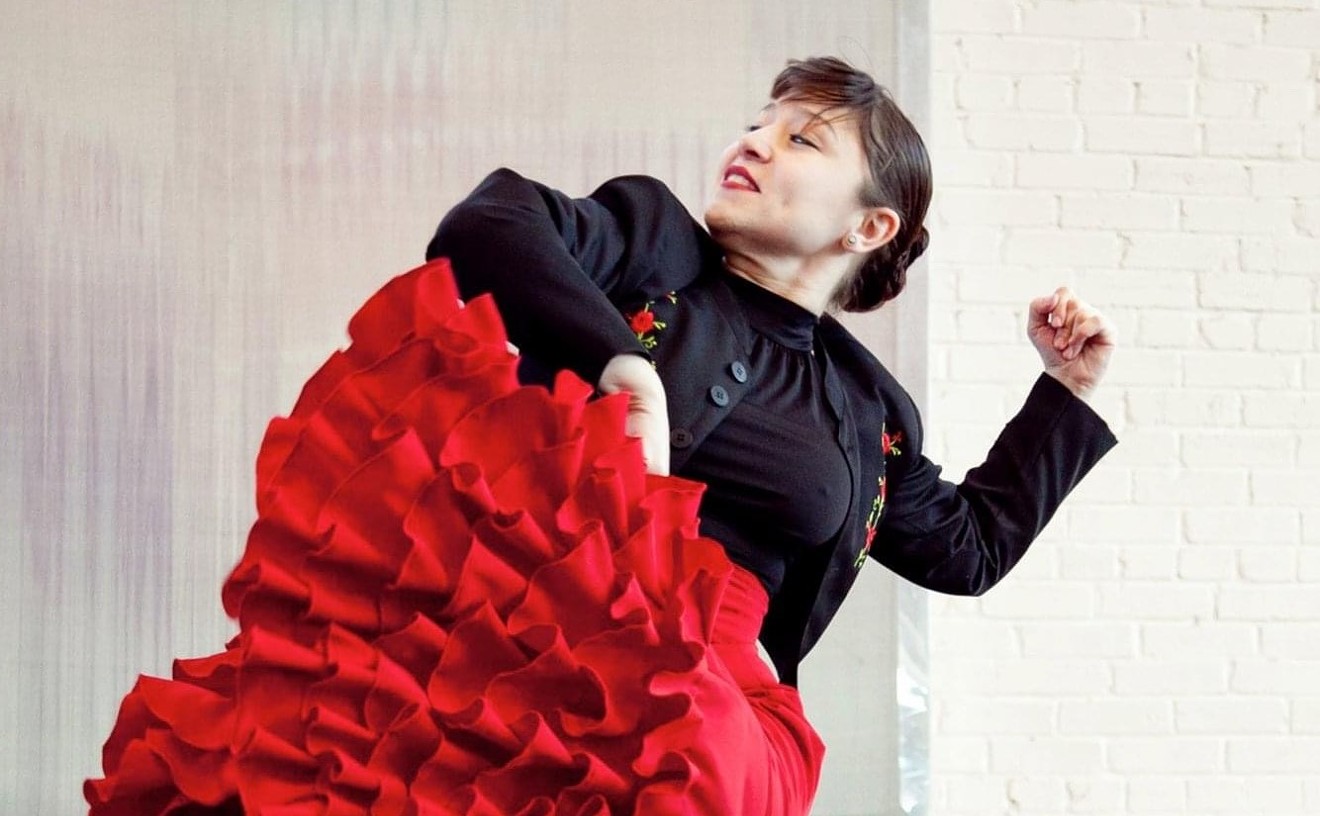And neither does Theatre Three's cast for The Hollow. They take a fusty 1951 script and, without tipping into melodrama, inject enough camp into their performances to make the dialogue and the characters feel funny and fresh. Jac Alder directed this production, and his deft choreography of dozens of entrances and exits and well-tuned ear for funny sounds and what sounds funny result in a play that crackles with Christie's witty wordplay and offers some of the best comic acting this stage has offered in some time. First scene to last, this show is killer fun.
The mystery's a doozy, too. A tried-and-true Christie gimmick gets the game afoot, as a group of guests--six little Indians, marked down from 10--gather for a weekend romp at a run-down estate outside London called The Hollow. Hosting the party are the resident toffs, a dotty old couple named Sir Henry (Terry Vandivort) and Lady Lucy Angkatell (Sally Cole), along with their niece Henrietta (Gina Handy), a sculptor who exudes all the warmth of a slab of Travertine.
Into the Angkatells' drawing room (nicely designed and furnished in shabby velvets and brocades by Harland Wright), guests arrive by ones and twos. A second niece, the orphaned Midge Harvey (Mary-Margaret Pyeatt), quickly asserts her position as the poor relation. She's on a break from her miserable job as a London shopgirl. Secretly, Midge loves wealthy, sad-sack cousin Edward (Scott Meek), heir to the family's pile of bricks known as Ainswick (think Manderly without Mrs. Danvers). But Edward carries a torch for Henrietta, who's having a fling with the very married and devilishly handsome Dr. John Cristow (Brent Alford). He blusters into the party shadowed by wife Gerda (Sue Birch), a creature as ungraceful as her name. As Cristow openly flirts with Henrietta, he verbally dresses down dowdy Gerda, who seems to resonate with a dull, one-note hum of despair.
Through the French doors bursts the Angkatells' next-door neighbor, flame-haired American film star Veronica Craye (Morgana Shaw), who has Bette Davis' eyes, Joan Crawford's shoulders and Barbara Stanwyck's guttural laugh. She also has a past with Dr. Cristow and fantasizes that he's ready to run off with her to Lalawood and leave Gerda in the dust.
When most of the guests head outside to practice target shooting--what else?--Cristow briefly is left alone. Someone, probably not the butler, sneaks up through the garden with a .38 and plugs the doc, leaving him sprawled on the Oriental. Enter the maid (the spot-on hilarious Kelly Thomas) to end Act 1 with a bloodcurdling shriek.
Act 2 brings on this play's faux Poirot, Inspector Colquhoun (Richard Zavaglia, adopting an imperious Duke of Windsor accent), to interrogate the suspects. Many of them have good reasons for wanting the doc dead. To wrap up the Cristow case, Colquhoun and his young assistant copper, Sergeant Penny (Blair Mitchell), will employ every cliché in the Agatha Christie canon. But even though the ending is telegraphed louder than Morse code on a kettledrum, it all comes to a satisfying denouement.
Besides the pre-CSI techniques of crime-solving that Christie gives Colquhoun to bait the mouse into the trap, what makes this production of The Hollow irresistibly entertaining is its wonderful company of actors. Here are thesps who use subtle comic touches to create broad characters. The best at this is the diminutive Sally Cole, whose Lady Lucy is a mini-Lady Bracknell with perhaps a soupçon of Lady Macbeth. Christie's running joke for Lady Lucy is to have her constantly misplacing the oddest things around the drawing room. "Did I leave my mole trap in here?" she chirps on her first entrance. And later, "Now where did I lay my eggs?" When the doctor is found toes-up on the carpet, Lady Lucy squeals happily, "Ooooh, our first murdah!" She escapes suspicion for that felony, but Cole steals so many scenes as Lady Lucy, she could be charged with larceny.
Brent Alford delights as a cruel but dashing Dr. Cristow. "How was I to know devotion could be so irritating?" he growls about dreary wife Gerda. Sue Birch, eyebrows pitched up like resting oars, is heartbreaking as the sorrowful wife, sagging under the burden of loving a philandering husband.
Were this an old movie, the roles of old-maid cousins Edward and Midge would be played by Van Heflin and Teresa Wright. Here, Scott Meek and Mary-Margaret Pyeatt are just right as second-tier characters who might have stepped off the screen of a '50s film noir. Pleat-happy period costumes by Patty Korbelic Williams aid the illusion.
Only Gina Handy as the sculptress and Morgana Shaw as the vampy movie star go a mite too far with their characters. Handy makes Henrietta too bitter and unlikable. Shaw's Veronica Craye too quickly turns from glamourpuss into blowsy Jessica Rabbit. But their missteps are small ones. Everyone else's good work makes up for their shortcomings.
It would be a crime not to share in the comic magic of The Hollow.
About the same time Agatha Christie penned The Hollow, Noel Coward turned out what he dubbed "an unpleasant comedy in two scenes'' called Fumed Oak, part of a trilogy of one-acts titled Tonight at 8:30. Bucket Productions presents Fumed Oak as its entry in the Festival of Independent Theatres now onstage at the Bath House Cultural Center.
The key to what goes so terribly wrong in Bucket's approach lies in Coward's subtitle for the play. He called it an "unpleasant comedy." Bucket's director, Jimmi Wright, and the four actors make it simply unpleasant. They miss every opportunity for comedy and go so far in the other direction, their Fumed Oak should carry an R-rating for violence.
The play is a breakfast-table vignette. The Gows--father Henry (Chad Tiller), mother Doris (Karyn Lush Wright), young daughter Elsie (Kate Bristol) and Doris' mother (Alice Montgomery)--glumly sip tea and munch toast while carrying on banal chitchat about plumbing, head colds and other non sequiturs.
Suddenly, Henry rises from the table and announces he's leaving. For good. On a slow boat to China. Why? To escape "that horrid little girl and that old bitch of a mother of yours," he tells Doris. She begs him to stay. "I shall never see you again as long as I live," he says as he makes his exit. "It's a dream come true!"
One can imagine the light touch Coward meant to be applied to such exchanges. The secret to Fumed Oak is not to play to the anger of the characters, but against it. The Bucket actors pour on the histrionics. Montgomery grabs Tiller by the ankles and wails like a banshee. He physically assaults the mother-in-law with unrestrained fury. It's so, so wrong.
Where subtlety is required, the Bucket bunch spill their guts. When at last Tiller flings a big slice of ham to the floor, he's being redundant.










